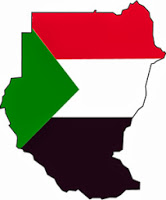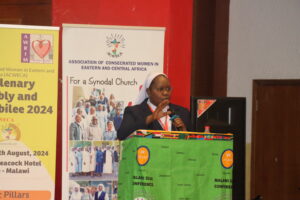SUDAN: The challenge of having one Conference for both Sudan and South Sudan

Despite
the fact that the Sudan and South Sudan separated two years ago and are now
autonomous, the Catholic Church in the two countries has maintained one
Bishops’ Conference. According to Msgr. Thomas Oliha, AJ, the Apostolic
Administrator of Catholic Diocese of Torit, “The secession of South Sudan from
Sudan is only viewed by the Catholic Church as a political separation, we the Church remains as one.”
In
order to be inclusive of South Sudan, Sudan Catholic Bishop Conference (SCBC)
is now known as SCBC-SSS,
which basically translates to Sudan Catholic Bishops Conference-for Sudan and
South Sudan. Speaking to AMECEA Online news in Nairobi where he had attended
AMECEA Executive Board Meeting, Msgr. Thomas said that it was the decision of
the Bishops during their plenary held in Khartoum Sudan in August this year to
have the name SCBC-SSS adding that process to make it official are however
underway.
order to be inclusive of South Sudan, Sudan Catholic Bishop Conference (SCBC)
is now known as SCBC-SSS,
which basically translates to Sudan Catholic Bishops Conference-for Sudan and
South Sudan. Speaking to AMECEA Online news in Nairobi where he had attended
AMECEA Executive Board Meeting, Msgr. Thomas said that it was the decision of
the Bishops during their plenary held in Khartoum Sudan in August this year to
have the name SCBC-SSS adding that process to make it official are however
underway.
Despite
the Bishops’ noble intention to maintain one conference between the two
countries; they are facing lots of challenges. In February this year, the
Secretary General to the Bishop’s conference who is a South Sudanese, Fr.
Santino Morokomomo Maurino was deported from Khartoum from where the
Secretariat was located.
the Bishops’ noble intention to maintain one conference between the two
countries; they are facing lots of challenges. In February this year, the
Secretary General to the Bishop’s conference who is a South Sudanese, Fr.
Santino Morokomomo Maurino was deported from Khartoum from where the
Secretariat was located.
The
government of Sudan continues to restrict visas of Catholic Missionaries who
wish to go and work in Sudan while at the same time, Missionaries who are
already working there, cannot have their visas are not renewed upon expiry.
government of Sudan continues to restrict visas of Catholic Missionaries who
wish to go and work in Sudan while at the same time, Missionaries who are
already working there, cannot have their visas are not renewed upon expiry.
The
situation is no different for the clergy; “All clergy members and Religious perceived
to be South Sudanese nationals cannot leave the country and come back to serve
in Sudan. They are however free to stay and serve as long as they want, but the
moment they step out of the country; that marks the end of their stay in Sudan,”
says Msgr. Thomas. This is the same reason why the conference decided during
their plenary in August this year to appoint a Secretary General and two
assistants; the Secretary General who is a South Sudanese stays in Juba with
one assistant, while the other assistant who is a Sudanese stays in Khartoum.
situation is no different for the clergy; “All clergy members and Religious perceived
to be South Sudanese nationals cannot leave the country and come back to serve
in Sudan. They are however free to stay and serve as long as they want, but the
moment they step out of the country; that marks the end of their stay in Sudan,”
says Msgr. Thomas. This is the same reason why the conference decided during
their plenary in August this year to appoint a Secretary General and two
assistants; the Secretary General who is a South Sudanese stays in Juba with
one assistant, while the other assistant who is a Sudanese stays in Khartoum.
Msgr.
Thomas however is hopeful that the situation will change with a new regime in
Khartoum. “We can only remain hopeful that with the change of government in
Khartoum, religion freedom will be achieved,” he said adding that the
government in Khartoum is however not strict on Sudanese natives who are
Christians. “In the diocese of El Obeid in where the clergy and Christians are
natives, the government does not give them trouble; everything is okay there,”
he said.
Thomas however is hopeful that the situation will change with a new regime in
Khartoum. “We can only remain hopeful that with the change of government in
Khartoum, religion freedom will be achieved,” he said adding that the
government in Khartoum is however not strict on Sudanese natives who are
Christians. “In the diocese of El Obeid in where the clergy and Christians are
natives, the government does not give them trouble; everything is okay there,”
he said.
Sudan
has two Catholic Dioceses namely the Archdiocese of Khartoum, the Diocese of El
Obeid while South Sudan has seven namely the Archdiocese of Juba, the Dioceses
of Torit, Rumbek, Wau, Malakal, Yei and Tambura-Yambio.
has two Catholic Dioceses namely the Archdiocese of Khartoum, the Diocese of El
Obeid while South Sudan has seven namely the Archdiocese of Juba, the Dioceses
of Torit, Rumbek, Wau, Malakal, Yei and Tambura-Yambio.
Source: AMECEA Social
Communications
Communications


